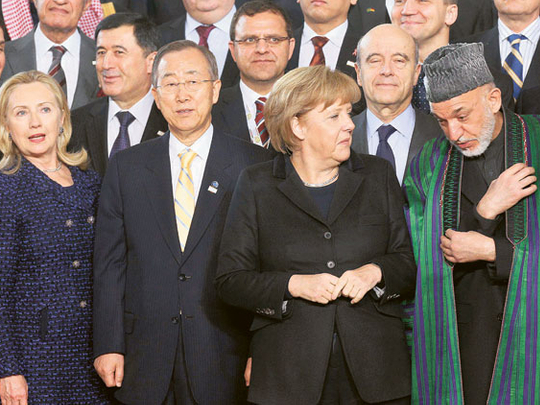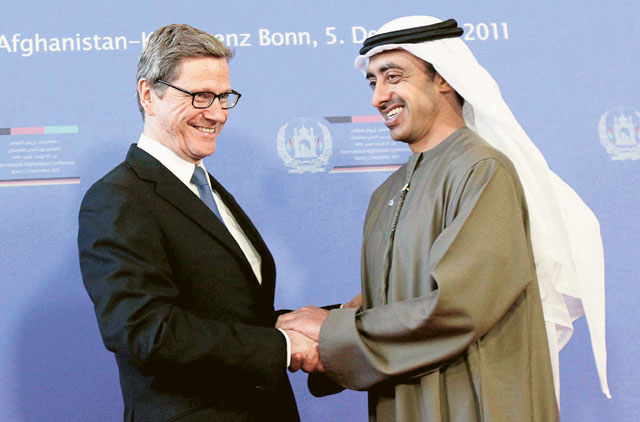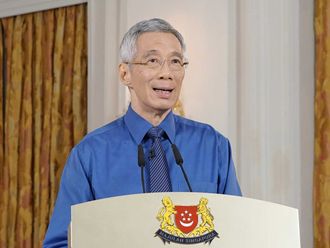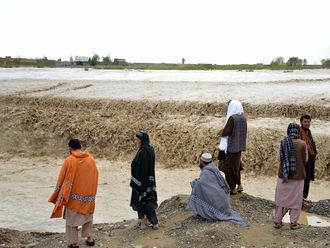
Bonn: The US and other nations vowed yesterday to keep supporting Afghanistan after most foreign forces leave the country in 2014, as the nation faces an enduring Taliban-led insurgency and possible financial collapse.
"The United States is prepared to stand with the Afghan people for the long haul," US Secretary of State Hillary Clinton told a global conference on Afghanistan's future that was overshadowed by the absence of key regional player Pakistan.
The international community has "much to lose if the country again becomes a source of terrorism and instability", she added.
The Bonn conference is focused on the transfer of security responsibilities from international forces to Afghan security forces during the next three years, long-term prospects for international aid and a possible political settlement with the Taliban.
Clinton stressed that in return for continued support the Afghans must live up to their commitments "on taking difficult decisions to embrace reform, lead in their own defence and strengthen an inclusive democracy rooted in the rule of law".
About 100 countries and international organisations are represented among the 1,000 conference delegates, including some 60 foreign ministers. The attendees are hoping to agree on a set of mutual binding commitments under which Afghanistan would promise reforms and work towards goals such as good governance, with donors and international organisations pledging long-term assistance in return to ensure the country's viability beyond 2014.
"Together we have spent blood and treasure in fighting terrorism," Afghan President Hamid Karzai said. "Your continued solidarity, your commitment and support will be crucial so that we can consolidate our gains and continue to address the challenges that remain. We will need your steadfast support for at least another decade."
Foreign aid
Afghanistan is economically dependent on foreign aid and spending related to the huge military presence, currently totalling about 130,000 international troops. The country seeks assurance that donor nations will help fill the gap after most forces leave by 2015.
Although donor nations will not commit to specific figures at the one-day session yesterday, they will sign up to the principle that economic and other advances in Afghanistan since the removal of the Taliban government in 2001 should be safeguarded with continued funding.
Afghanistan estimates it will need outside contributions of roughly $10 billion in 2015, or slightly less than half the country's annual gross national product, mostly to pay for its security forces, then slated to number about 350,000.
Pakistan is a central player in regional efforts to improve trade and strengthen its weak economies. But its boycott has cast a pall over the session, because it points out that nation's influence in Afghanistan and its ability to play the spoiler.
Pakistan is seen as instrumental to ending the Taliban-led insurgency in Afghanistan because of its links to militant groups and its unwillingness, from the US and Nato perspective, to drive insurgents from safe havens on its soil where they regroup and rearm.
Pakistan cancelled its participation to protest last month's Nato air assault, carried out from Afghan territory, that killed 24 Pakistani soldiers. The deaths fed the popular perspective in Pakistan that the US and Nato, not the Taliban, are Pakistan's principal enemies.
"No one is more interested than the United States in getting to the bottom of what happened in the border incident," Clinton said with an edge in her voice. She has called the deaths tragic and pledged a thorough investigation, but Pakistan rebuffed her entreaties, as recently as Saturday, to reconsider and attend the conference.
Pakistan's army accused Nato of a "deliberate act of aggression", an assertion the Pentagon hotly denied. Pakistan has received billions in US aid since 2001, largely in expectation of cooperation against militants.
Afghanistan's western neighbour Iran joined the conference, and Foreign Minister Ali Akbar Salehi said the country stands ready to support Afghanistan and "welcomes the departure of the international military", condemning the idea of any bases remaining after 2014.













